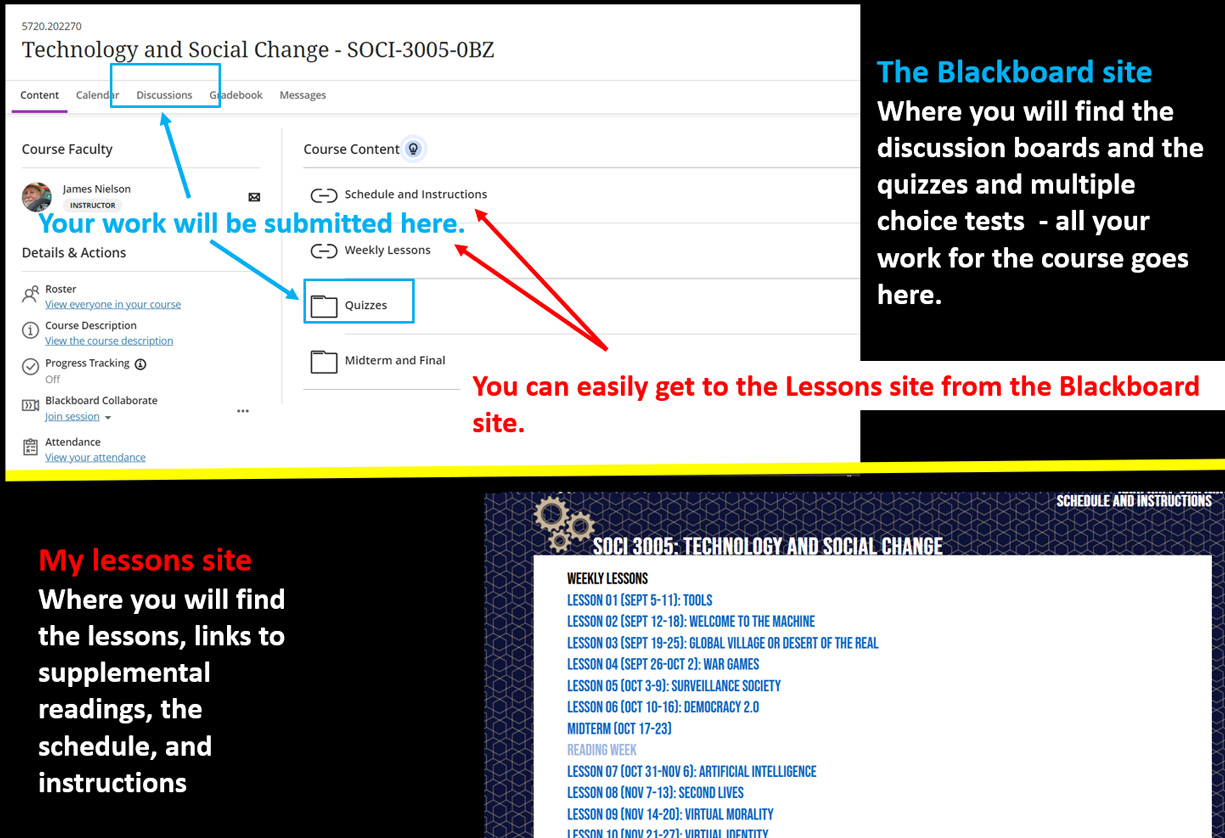Welcome
Welcome!

Welcome to Technology and Social Change. I'm Jim Nielson and I'll be your instructor for the first half of this course (more about that in a moment). I'm the person who will mark your work, and I'm also the author of the lessons you will read. I like to be called Dr. Jim. (I really wanted to be a DJ, but it was too much work.)
Quick Start Guide
- You will read a new lesson each week.
- Almost every week you will be writing a discussion post on the week's lesson; you will also be replying to other people's discussion posts.
- Your own post is due on FRIDAY night at the latest; your replies are due on MONDAY night at the latest.
- There will be a multiple choice quiz online every couple of weeks and a multiple choice midterm test and final.
- There is nothing due this first week, but you should familiarize yourself with the course and read the first lesson.
- If you miss a discussion post you cannot submit it late for marks; you have to make up the marks a different way. See the notes in the red box below. The first discussion board will be on next week's lesson.
There isn't really any "quick start" guide. This course involves a lot of focused reading. This welcome message, the schedule of lessons and assessments, and the notes on discusssion posts should clarify many of the expectations around the successful completion of this course.
Please read this entire page carefully, and perhaps even print it out and make some notes. It lays out many important points about how the class works and your responsibilities.
This is an asynchronous online course. There will be no lectures or synchronous video sessions. Long before the pandemic lockdown, this course was designed as an entirely online class, and we will be teaching it that way again this semester. I can make myself available for office hours in MS Teams if needed, but we will mainly be interacting through Blackboard discussion forums. I think most of you will find that this creates an excellent, stimulating, and surprisingly meaningful learning experience!
Weirdness: The Two Doctors
If anyone is a fan of the Doctor Who SF franchise you will recognize the concept of regenerating. Halfway through the class (after Reading Week) I will be quietly replaced as your instructor by a younger and fresher guide: Chris Clemens.
Since Chris and I act more as monitors and markers than anything else, and since Chris has taught this course almost as many times as I have, you should barely notice this changeover. Chris has contributed things to the course and teaches his own courses on technology at Humber, but he should not be held responsible for the lessons you will be reading. He may occasionally have something to say about them himself.
The reason for the change of professor is contractual rather than anything either Chris or I would have chosen. Almost all summer courses at Humber work like this. I have to go on vacation at the end of June, and Chris has to come off vacation then. If you have any questions or concerns, feel free to contact one or both of us.
Overview of the course
The course is about how our changing technologies influence human behaviour and social interaction, and how technology can actually have a shaping effect on "human nature" as such. Technology doesn't just mean today's electronic advances, but everything humans have done to extend our reach into and impact on the world (for better or worse), from agriculture and the invention of the wheel to Artificial Intelligence. The focus in this course, however, is the last couple of hundred years.
Broadly speaking, the first half looks at some of the technological changes that have arisen, mostly in "the Western world," since the Middle Ages. The early lessons will explore how the technological breakthroughs of the Industrial Revolution and the current "Information Age" have helped shape who most of are in North America today. We will look at the mechanization of work, the rise of ever more realistic and seductive virtual realities, technologies of war and surveillance, and how politics and the democratic process may or may not change because of technological opportunities and pressures.
Following the midterm, we will be taking a closer look at how our current digital and network technologies may be changing human life - in particular, social interaction, our sense of self, morality, and what it means to be a human being. We'll look at changes to our understanding of intellience and knowledge; we'll watch documentaries about people who spend significant amounts of their time in virtual worlds like Second Life, VRChat, and multiplayer games; we'll explore new moral questions that only arise when we have multiple, virtual social personas; we'll question the meaning of human identity itself; we'll examine love and sex in the networked world; and we'll take a peek at the possibility of greater than human intelligence emerging in the near future, perhaps taking humans into a new form of existence that we can only guess about at present.
Prepare for some more slight weirdness. There are two web sites you need to be aware of.
1. soci3005.com The lessons and instructions for assignments will be found at soci3005.com. You are there now if you are reading this. ("Be here now.") You can think of this as the "textbook."
The weekly lessons are chapter-length, and though some can be a challenge for those not used to focused reading, people generally find them stimulating, reasonably "entertaining," and ultimately digestible. They are lightly illustrated, and make use of vidoes, diagrams and charts where visual learning seems appropriate. Most of the lessons include at least one or two videos, but the lessons are generally like (longish) web articles or book chapters that you need to read and absorb. You should put aside a couple of hours each week for undistracted reading of the lesson. If you're not used to focused reading, you may want to get software to read the lessons aloud to you. I don't recommend using ChatGPT to summarize them. A lot of the meaning comes in the telling.
2. Blackboard Instructor announcements, discussion boards, quizzes, and exams are handled in the Blackboard site. There are links in the Blackboard site to the lessons and schedule on soci3005.com.

Readings
The readings you are held responsible for are my lessons. Suggested additional readings and viewings are available on the web or as downloadable PDFs. These are linked to from the right-hand sidebar for each lesson. You are expected to read carefully and without distraction each lesson before or during the week it is assigned. Then you are asked to think about the ideas in the lesson, and then to respond to them. That is the "class," and at least the amount of time you would spend in a lecture should be devoted to it each week.
Exercises and assessments
Your mark in the course is based on three kinds of exercises and assessments: (1) quizzes on the information in the lessons, (2) discussion posts, and (3) exams.
Basically, after this first week, you have discussion posts due every week, except for the week of the midterm exam. Every second week, more or less, there will be an online quiz covering the previous two weeks. There is a multiple choice midterm and a multiple choice final.
The discussion posts are worth 40% of your mark. The quizzes are 20%. The exams are 20% for the midterm and 16% for the final. The discussion posts (and the lessons, of course) are the core of the course.
You will get full marks for the discussion posts as long as you make them on time and follow the instructions. The quizzes and exams are marked to assess your accurate knowledge and understanding of the material I've presented. Quizzes and multiple choice exams are marked in an automated way by Blackboard. You can of course look up the answers in another browser window, but the timing is fairly tight so you would be wise to pay attention when reading and to review the Key concepts, people, etc topics in the right-hand sidebars of the lessons before taking the multiple-choice assessments.
More about the discussion posts
The discussion posts are meant to replace classroom discussion and aid in study and enriching all of our understanding. Each week you are expected to write a medium-length (usually 250-750 words) response to the week's lesson by midnight on Friday night, and then you should go back and read all or many of the posts by your colleagues for that week and respond to two of them by Monday night at midnight.
Do not use ChatGPT. If your post is full of generalities and vague statements and sounds like it was written by a chatbot you will not get credit. Misspell some words, mess up the grammar, say something only a flawed human would say. Let me hear your voice. Focus on my lesson and what YOU thought. I want to hear that I've been understood. I want to hear your voice, even if English isn't your best language, or you don't like writing, or whatever.
Don't plagiarize - not from Internet sources, not from my lessons, not from each other. I’m not marking you on grammar, English, or whether or not you agree with the stuff I've introduced you to. I’m marking you on whether YOU have made an attempt to understand and think about the lesson. If you quote from something, don’t worry about proper referencing, but please show where it came from, so that one could track it down with an Internet search. Quoting is an art form and a kind of creation, where “Old words are reborn with new faces,” as Criss Jami said in Killosophy. (For instance.)

Not this. Your purpose is to CONTINUE the conversation - add to it, make them think twice, tell them how their insight has ignited a new thought in your own head. Argue with them. Ask them a question about what they said.
You will get the full two marks for your own post as long as it is clear that you have read the lesson for the week you are responding to. You can say anything you want about it! You can ask a question about something you had difficulty understanding, make a comment or criticism, add to what is said in the lesson, and so forth. Do not just write something about what you think the lesson is about without having read it. You will want to mention ideas from the lesson explicitly, to be sure it is clear that you read it and thought about them ...
You will get 1 mark for each of your two responses to other student posts. You can ask them a question, raise another point, agree or disagree with what your colleague has written. Do not just write something like "It's so true! LOL." You should be continuing a conversation with the author of the post you are commenting on, not just saying something vague or thanking them. Think in terms of writing more than 100 words, not just a sentence or two. Further guidelines and some examples from previous semesters will be found under the Discussion Posts tab.
What you should do for this class each week
1. Read the lesson, before Friday night.
2. Share your first thoughts/questions/ideas about the lesson in a discussion post by 11:59 pm on Friday night. (Posts tend to be between 250 and 750 words. Take a look at the examples in the Discussions tab. Occasionally people are inspired to write even more than 1000 words. That's fine!) (2 marks)
3. Read your colleagues' posts on the lesson and respond to two of them by 11:59pm on Monday night. (1+1 = 2 marks)
Each week I will be reading through the discussion responses from the previous week and commenting on some of them in the forum. I will also, as time permits, draw attention in a Blackboard announcement to any of the posts I thought were particularly worthy of comment or attention. I will generally provide any feedback directly within the discussion board; I am one more participant in the discussions. If I don't respond to a post you made, it doesn't mean anything one way or another. I used to reply to more posts, when the previous version of Blackboard would alert you if someone replied to your post, but now I rarely enter into the discussion. People seem to be happy to have me as the instigator of the discussions (through the lessons) and to dig deeper and answer questions pn their own in the boards.
PLEASE READ CAREFULLY: IF YOU MISS THE DEADLINE ON A DISCUSSION POST
You cannot submit a discussion post late and get credit for it.
This is because the primary audience for these posts is not me, but your fellow students. If you submit to a board after the deadline, it's unlikely any other student will ever see your post.
You can make up a maximum of six marks total for missed posts in each half of the semester. The only way to make up these marks is writing additional replies in a board that is currently active. (Adding replies to a board past its deadline will not lead to make-up marks.)
You can make up a maximum of two marks in any active week's board by writing two additional replies (i.e., four replies instead of two). You cannot make up more than two marks in any single week's board.
IMPORTANT
- If you miss the Friday night deadline for your own post, you cannot make up those marks by writing four replies but no post in that week's board. You cannot write four replies instead of a post and two replies.
- You cannot write extra discussion replies to make up marks for non-discussion board assignments or simply to get bonus marks. These extra replies can only be written to make up for earlier missed or late discussion board posts or replies.
- Marks missed in the first half of the semester must be made up in boards that come before the midterm.
For instance, if you failed to post and reply on the first board on Lesson Two, you would lose four marks. If you wanted to make those marks up, you could could write two extra substantive replies to a later board before the midterm. For instance, you could reply to four rather than two posts in the board for Lesson Four while that board was active. I would apply 2 marks to your missed Lesson Two board. You could make up the other two of the missed marks by writing two more additional replies in the Lesson Five board.
If you miss a Friday night post, but can make it up over the weekend, you should message me and ask if I will accept it. I probably will as long as you don't make a habit of this. Your post must be available for people to read and comment on by Monday.
If you have questions about this, please email me or send me a message through Blackboard.
I strongly suggest that you do your work in the class before the dropdead due date. You should ensure that your browser works fully with Blackboard and contact support if it doesn't. There is a sample quiz under Assessments that you can use to test your brower before you take the first quiz for marks. You will find advice about ensuring that your browser works with all components of Blackboard under the Browser Recommendations tab. These are specifically about making sure your browser deals well with Blackboard Collaborate (the synchronous video conferencing component that we will be using very little in this class), but following the advice should ensure that you don't have other problems with the quizzes and discussion board.
So one last time, as a piece of unsolicited advice (for this course and school in general), you don't have to wait until the last minute to do your posts and quizzes. I always recommend that people "backdate" their due dates on all their schoolwork by at least two days, so that they are not doing them at the last possible moment. Embrace the peace of mind that being proactive can bring.
If you know you are not going to be able to complete something on time, please contact me ahead of time, and we may be able to come up with alternative work for you to do. Don't just miss assignments and then do them at the end of term hoping I will accept them late. If you haven't discussed it with me, I won't.
Contacting me
I do my best to respond very promptly, so if you have a problem, question, or concern please send me an email. You'll hear back quicker if you send me a real email at james.nielson@humber.ca if you can. I will receive this immediately on my phone and be able to reply ASAP, whereas Blackboard messages I will only see and respond to once a day or so.
I genuinely look forward to collaborating on this class with you, and I expect to learn a great deal from you! Hopefully you'll learn something worthwhile from me as well. Good luck, and welcome aboard!
Wellness.
Dr Jim
Not sure what to do next? Read the intro lesson.
Or just watch this inspirational video that picks up on the theme of our slavery to the technology that is highlighted in the intro lesson, the mechanical clock: